
October 2014
No Party or Candidate Presents a
Class Challenge
Brazil: The
Election Racket
of the Bourgeoisie
Cast a Blank Ballot and Forge a Revolutionary Workers Party!
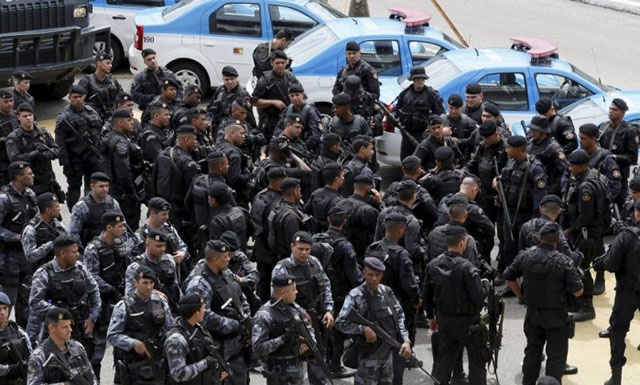
Militarized “democracy.” Special operation of the Shock Battalion (Batalhão de Choque) of the Military Police of Rio de Janeiro took the streets to oversee elections (and intimidate voters). (Photo: Marcos Tristão / Agência O Globo)
The following is a translation of an article published by our comrades of the Liga Quarta-Internacionalista do Brasil (Fourth-Internationalist League of Brazil). Since it appeared, Dilma Rousseff, the incumbent president and candidate of the Workers Party came in first in the initial round of balloting. In a second-round runoff election on October 26, Rousseff narrowly won with 51.5% against 48.5% for the right-wing candidate Aécio Neves of the Brazilian Social Democratic Party.
OCTOBER 2 – We’re now at that time in the political cycle when the TV screens are filled with talking heads, theatrically pontificating and making empty campaign promises; when the electoral marketing firms are raking in profits hand over fist, when messengers hand over suitcases stuffed with cash to parliamentary deputies-for-hire, and union bureaucrats of all stripes clamp down on the workers’ struggles and instead dedicate themselves to rounding up votes. The Brazilian elections of 2014 are no exception to this rule. We Marxists do not reject on principle using the bourgeois electoral circus as a platform to present the revolutionary program, even as we recognize that this is enemy territory. But in this election there is no party or slate which could represent a working-class vote against capitalism.
The three main candidates – Dilma Rousseff, of the Workers Party (PT), Marina Silva of the Brazilian Socialist Party (PSB) and Aécio Neves of the Brazilian Social Democracy Party (PSDB) – all defend capitalist rule. Even though the PT is partly based on the workers movement, its program is strictly limited to the framework of capitalism. Beyond that, even before it undertook governing the country in 2003 under the presidency of Luiz Inácio Lula da Silva, this “bourgeois workers” party (as Lenin defined the British Labour Party) organized a popular front with bourgeois forces in order to subordinate the workers to the dictates of the bourgeoisie.
The popular-front government of Dilma Rousseff and her vice president, Michel Temer of the Brazilian Democratic Movement Party (PMDB), the main bourgeois component of the PT’s stable of allies, has been deteriorating after 12 years in office. Last year there was an explosion of street protests of up to a million people in Rio de Janeiro against the social policies of the governments. The most prominent capitalist associated with Dilma, Eike Batista, saw his oil company, OGX, implode in a spectacular bankruptcy. The British magazine The Economist (28 September 2013), which in 2009 published a special report under the title “Brazil Takes Off,” did an about-turn, asking, “Has Brazil Blown It?” It concluded that “Brazil’s voters have little reason to give her” a second four-year term.
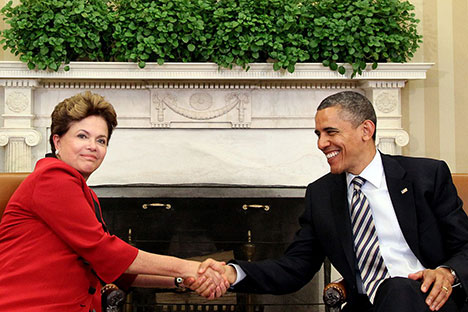 Brazilian president Dilma Rousseff with her imperialist
overlord, Barack Obama in the White House, April 2012.
Meanwhile, NSA was listening to phones of Rousseff and her top
aides. (Photo: Roberto
Stuckert Filho/Presidência da República)
Brazilian president Dilma Rousseff with her imperialist
overlord, Barack Obama in the White House, April 2012.
Meanwhile, NSA was listening to phones of Rousseff and her top
aides. (Photo: Roberto
Stuckert Filho/Presidência da República) In 2014, after four years of a boom due to the export of raw materials to China, the Brazilian economy went into recession. There were big mobilizations denouncing extravagant expenditures for the World Cup of soccer while education and pubic health are starved of funds. Then the Brazilian team suffered a “humiliating” 7-1 defeat at the hands of Germany. A new corruption scandal exploded in the semi-state oil company Petrobras which could eclipse the Mensalão (the fat monthly payoffs to buy votes of legislators in nominally opposition parties)1Yet the São Paulo bankers have been making money like never before under the Lula and Dilma governments, and the PT president has garnered the praise even of the right-wing magazine Veja (Brazil’s equivalent of Time magazine). Above all, in the opinion surveys the PT has kept the support of low-income voters and a good chunk of the famous “middle class.”
The PT apparatus, pro-government and right-wing union bureaucracies (CUT, CTB, Força Sindical, UGT) and assorted spokesmen of the “center-left” media (Carta Maior, Carta Capital, Brasil de Fato, Emil Sader, Frei Betto, etc.) are calling for a vote for Dilma with various arguments, which boil down to two main appeals: the PT government has implemented an economic policy of “growth together with redistributing income” to the poor that is an alternative to “neo-liberalism”; and (since they no longer talk of imperialism) that it “pursued an independent foreign policy (Luciano Wexell Severo, in Correio da Cidadania, 2 October). Both explanations are a gross distortion of reality.
It is true that the several welfare programs, above all Bolsa Familia (the Family Fund), have reduced income inequality, the unemployment rate, the poverty rate (-55%) and the rate of extreme poverty (-65%) as well as raising the minimum wage, from 2003 to 2014. Yet Brazil continues to be one of the most unequal countries in the world (with a Gini index of 50.0), monthly average wage of less than $R 3,000 (roughly US$1,200), and the paychecks of industrial workers took a pay cut of 3.4% last year and up to 7.8% for metal workers. Moreover, from the very outset the Lula-Dilma government has attacked workers’ union gains with its “reform” of health and welfare benefits; it has smashed several strikes, and is preparing a new assault with the labor “reform” taking aim at union contracts.
In fact, the social and labor policies of the Brazilian popular-front government are quite in sync with neo-liberalism. According to the latter’s main theoretician, Milton Friedman, as well as financial institutions like the World Bank, its aim is to eliminate workers’ rights or “entitlements” (health care, pensions, public education) and deal with social problems like poverty with public-private partnerships and specific aid programs directed at the poorest of the poor (which taken together cost the bosses a lot less). The result is an attack on the working class, above all the unions, with crumbs for the poor. If PT policies differ at all – for example, raising the minimum wage instead of eliminating it – it is a kind of “social” neo-liberalism, “with a human face.”
And if in 2009-2010 Lula adopted Keynesian methods (of deficit financing) to combat the economic crisis, as Obama did in the U.S., the main reason for the Brazilian boom was exports to China, which was able to escape the worst consequences of the capitalist world economic crisis because it is a deformed workers state with a (bureaucratically) planned economy. As for its “independent” foreign policy, Brazil under the popular front, along with Bolivia and Ecuador, has a certain room to maneuver due to trade with China, but basically knuckles under to the demands of Yankee imperialism. One only has to look at the role that these countries (along with Chile and Argentina) play as a mercenary occupation force for imperialism in Haiti, with U.N. blue helmets, of course.
Concerning Marina Silva, despite her international fame as an environmentalist, ever since leaving the PT in 2008, in her presidential campaign for the Green Party in 2010 and today as a standard-bearer for the PSB, she has offered her services to the minor capitalist parties as the perfect “anti-PT candidate.” In reality, her program and candidacy have been crafted to pick up votes from the right should there be a second-round runoff election. Her pretentions as an environmentalist and defender of the forests are blown apart by the selection of her vice-presidential candidate, the senator from Rio Grando do Sul, Beto Albuquerque, well-known to be financed by “a number of companies linked to agribusiness”2 and by the National Association of Weapons and Munitions Manufacturers.
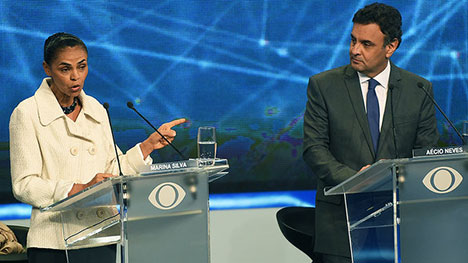 Marina Silva and Aécio Neves during presidential
TV debate, August 26. (Photo:
Ivan Pacheco/Veja)
Marina Silva and Aécio Neves during presidential
TV debate, August 26. (Photo:
Ivan Pacheco/Veja) Marina’s right-wing program linked to high finance is summed up in the demand for “independence for the Central Bank.” Independence from the government, that is, and instead dependence on the São Paulo bankers, headed up by Banco Itaú, and on the imperialist financial institutions such as the IMF, World Bank, etc. She also appeals to the most retrograde social layers with her opposition to gay marriage (which she says was included in the PSB program by “error”), to the rights of women (opposition to abortion) and her support for the homophobic pastor Marco Feliciano, the promoter of the “gay cure,” as head of the Human Rights Commission of the federal Chamber of Deputies. This brought Marina praise from Silas Malafaia, the notoriously right-wing proprietor of the evangelical protestant sect, the Assembly of God, to which she belongs.
Of course, all churches are bourgeois institutions, and the PT has always had a substantial Catholic left sector (where Marina had her political baptism). For her part, Dilma only supports abortion for those cases permitted under the 2013 law (rape, risk to the life of the woman and an encephalitic fetus) rather than defending the unlimited right of women to free abortion on demand in safe medical conditions, as we Trotskyists demand. But Marina is linked to fascistic, coup-plotting sectors and is opposed to revising the Amnesty Law to punish torturers from the military dictatorship (1968-1985), after having taken the opposite position in 2008. Her environmentalism is nothing but a green fig leaf to cover her program for an ultra-neo-liberal government of the religious right.
And Aécio Neves? Workers might have illusions in Dilma Rousseff or Marina Silva, but the candidate of the PSDB is a declared enemy of the workers movement and of the rights of all oppressed sectors in capitalist society, so there’s no point in spending any more time on him.
Campaigns of a Socialist” Left Bought Off by the Capitalist Government
So in the face of the onslaught by all the parliamentary parties against the rights and interests of working people, women, blacks and other oppressed sectors, one might ask if among the parties of the “socialist” left running in the presidential elections there is a slate that would merit critical support from revolutionaries. We are referring here to the candidates of the Partido Socialismo e Liberdade (PSOL, Party of Socialism and Freedom), of the Partido Socialista dos Trabalhadores Unificado (PSTU, United Socialist Workers Party) and Partido Causa Operária (PCO, Workers Cause Party.3. All three claim to be Trotskyist, or include internal tendencies which consider themselves Trotskyist, although their concrete politics are opportunist and quite distant from the Bolshevik-Leninism of Trotsky’s Fourth International.
To consider the question, we first have to establish the principles. From the time of the First International, the International Workingmen’s Association (IWA), the basic political orientation has been, as Friedrich Engels noted: “Our politics must be working-class politics. The workers party must never be the tagtail of any bourgeois party; it must be independent and have its goal and its own policy” (speech at the September 1871 London Conference of the First International). The next year, Marx and Engels wrote a resolution that was included as Article 7 of the statutes of the IWA, which stated:
“Against the collective power of the propertied classes the working class cannot act, as a class, except by constituting itself into a political party, distinct from, and opposed to, all old parties formed by the propertied classes.
“This constitution of the working class into a political party is indispensable in order to insure the triumph of the social revolution and its ultimate end – the abolition of classes.”
In this same period, Marx drew the lessons of the experience of the Paris Commune, writing:
“[T]he working class cannot simply lay hold of the ready-made state machinery, and wield it for its own purposes.”
–The Civil War in France (June 1871)
It was necessary to “smash” the bureaucratic-military machine of capital in order to carry out a revolution, beginning with the taking of power by the proletariat at the head of all the oppressed layers.
Against the anarchists, who reject participation in bourgeois parliaments and elections on principle, and also against the reformists who participate in these “democratic” exercises for the purpose of eventually administering the capitalist state, the Bolsheviks in tsarist Russia, knowing full well that the parliamentary and electoral terrain was bourgeois territory, used the platform to spread the revolutionary program and to call on the workers to wage class struggle against the exploiters. Summing up the Bolshevik campaign for the tsar’s impotent Duma, Lenin wrote: “the substance and mainspring of the Social-Democratic election platform can be expressed in three words: for the revolution!” (“The Election Campaign and the Election Platform,” October 1911)
Basing ourselves on these principles, whose validity has been confirmed by all subsequent history, we in the Liga Quarta-Internacionalista do Brasil (Fourth Internationalist League of Brazil), section of the League for the Fourth International, fight for total political independence from the bourgeoisie, its parties and its state. We reject voting for any party which is part of a popular front, a class-collaborationist coalition with bourgeois sectors, as is the case with the current Brazilian government led by the PT in alliance with the (social-democratic) PCdoB (Communist Party f Brazil), the PMDB, the PDT and bourgeois rightist forces (PSD, PP, PR, PRB). Yet the parties of the reformist “socialist” left, the PSOL and PSTU, even as they criticize the PT government, are merely seeking to form an alternative popular front.
So, for example, in 2012 the PSOL managed to elect the mayor of Macapá (in the northern state of Amapá) on the basis of a popular front, Unidade Popular, with minor bourgeois parties, which then in the second (runoff) round of the election was supported by the rightist DEM, the successor to ARENA, the political vehicle of the military dictatorship..4 Currently, the star candidate of the PSOL, Heloísa Helena, is again running for senator from the state of Alagoas, with the support of the PSDB in a formal pact. In addition to this alliance with the main party of the right, Helena also announced that she would support her friend Marina Silva for president, rather than backing Luciana Genro, the candidate of her own party, the PSOL! (Helena was also part of the party Silva set up [before becoming the presidential candidate of the PSB], the REDE, or Network.)
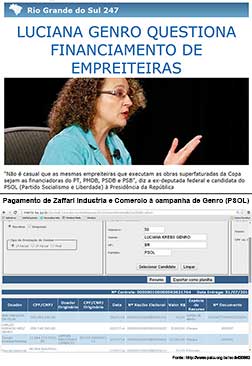 PSOL presidential candidate
Luciana Genro criticized major parties for being financed by
contractors (top), yet her party and her campaign received
donations from leading supermarket chain, Zaffari Group. Click
on image to see official record of donation (bottom).
PSOL presidential candidate
Luciana Genro criticized major parties for being financed by
contractors (top), yet her party and her campaign received
donations from leading supermarket chain, Zaffari Group. Click
on image to see official record of donation (bottom). In August, it came out that in Rio Grande do Sul, the PSOL received R$50,000 (about US$20,000) from the Zaffari Group, owners of the main supermarket chain in the state and the fifth largest in Brazil. Of this money, R$15,000 went to the campaign of Luciana Genro (whose father is the current PT state governor) and R$30,000 for the PSOL candidate for governor. Yet a month earlier, PSOL presidential candidate Genro criticized “that the same contractors who build the overpriced public works for the World Cup are the financiers of the PT, PMDB, PSDB and PSB” (Brasil 247, 2 July). Any contradiction there? Supermarkets, yes – contractors, no? Or is it PSOL, yes – the rest of the parties, no?
The PSTU, which published an article breaking the scandal about the PSOL, commented:
“When the capitalists do this with the traditional parties, they do so in the certainty that, once elected, they will be paid back with bids, policies, construction projects, among other things. In short, they do this in order to ensure that once elected the parties will govern in the interests of those who financed them. But when the capitalists do this with a party of the socialist left, which has in and around it a significant share of the activists of the militant social movements in our country, they do so – in addition to the above motives – in order to undermine the ranks of this organization. They do it in order to buy them off and destroy them.
“The leadership of the PSOL knows this, since they broke with the PT denouncing that. Why, then, do they ask for and receive financing from the bosses? Without political and financial independence, they will build another PT.”
One inconvenient detail: the PSTU had made an electoral pact with the PSOL, for an “independent candidate,” a “left opposition” to the government of Genro father. What to do? The PSTU’s answer: nothing, for they kept on supporting the PSOL-Zaffari candidate. And don’t forget that two years ago, the PSTU was part of a coalition to support the (victorious) candidate of the PSOL for mayor of Belém, Edmilson Rodrigues, even after criticizing him for accepting money from companies. In Alagoas, the PSTU announced that “we are withdrawing from the campaign” of Heloísa Helena because of her agreement with the PSDB, but it still supported the PSOL candidate for governor.
Despite all this twisting and turning, the PSTU insists that “we don’t accept funds from companies because we wish to maintain our commitment to the working people and our independence with regard to the bosses.” And how about with regard to the capitalist state? Why then, did the government’s Party Fund dole out R$772,000 (a little over half a million U.S. dollars) to the PSTU in 2013, and in the first nine months of this year another R$604 thousand? (The PSOL got quite a bit more, R$3.7 million [US$1.5 million] in 2013 and R$3 million so far in 2014.)5 The columnist Demétrio Magnoli, writing in Folha de S. Paulo (23 August) vituperates against the “lucrative business” of Revolution – a total lie, since the PSTU hasn’t the least intention of making a revolution and only wants to administer bits and pieces of the capitalist state.
“He who pays the piper calls the tune,” writes the PSTU, adding: “In elections it’s no different. Whoever finances the candidacies is who, after the campaign is over, will define the policies.” Correct, and this not only applies to banks, contractors or supermarkets, but also to the capitalist state. The right-wing press complains about the money paid by the state to the “midget parties,” in the same way it complains about television time accorded to left-wing parties. We are opposed to all prohibitions or restraints on access to the communications media. But a party that receives money from the capitalist state is a hostage of the bourgeoisie: its political campaign, and its very existence, depend on the good will of the apparatus which manages the affairs of the bosses.
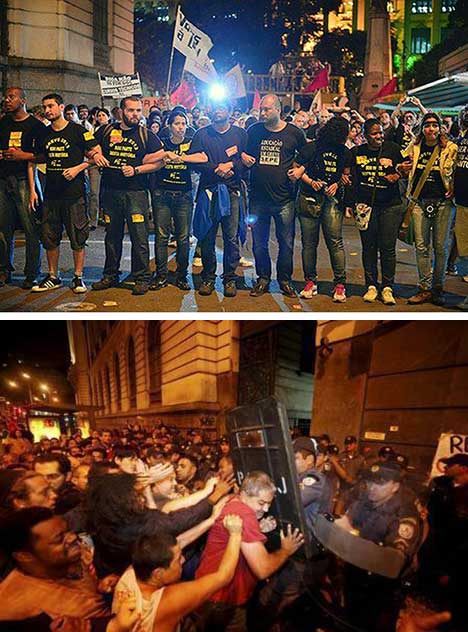 (Top)
Defense squad of Rio de Janeiro teachers union SEPE during
strike last year. (Bottom) Teachers clash with police when
they were refused entry to Rio city council debate on teachers
salary and seniority bill, 8 October 2013. Union leaders
affiliated with PSTU and PSOL acted as firemen for the bosses,
calling off the strike despite massive popular support.
(Photos: CLC)
(Top)
Defense squad of Rio de Janeiro teachers union SEPE during
strike last year. (Bottom) Teachers clash with police when
they were refused entry to Rio city council debate on teachers
salary and seniority bill, 8 October 2013. Union leaders
affiliated with PSTU and PSOL acted as firemen for the bosses,
calling off the strike despite massive popular support.
(Photos: CLC) But in the end, one can hardly expect principled political consistency from the followers of the late fake Trotskyist caudillo Nahuel Moreno, who embodied the opportunism of unprincipled alliances with variable denominators6 Faced with pseudo-socialists like these reformist opportunists, revolutionary Marxists and class-conscious workers cannot vote for the candidate of the PSOL, nor for Zé Maria Almeida, the perennial candidate of the PSTU, as they do not represent, even minimally, a class opposition to the capitalist regime. Quite the contrary, in the recent struggles of the São Paulo metro (subway) workers and Rio de Janeiro teachers – in the latter case there were arrests of activists who still can’t leave the jurisdiction or attend public demonstrations without a judicial order – the role of fireman to put out the flames of the class struggle has passed from the PT to the PSOL and PSTU.7
The centrist Partido Causa Operária uses rhetoric ever so slightly to the left of the PSOL and PSTU, but at bottom its politics don’t differ from those of the reformists. Currently the PCO is obsessed by the supposed danger of a coup d’état, another 1964 in Brazil or Germany 1933. In the militant struggles of the June Days of 2013 the PCO saw a fascist danger, which is craziness and serves as an excuse for backhanded support to the PT government. It diverts the attention of the masses from the fact that the real danger of bonapartist repression comes from the PSDB state government (in São Paulo) and the PT federal government.
The PCO polemicizes against “The Political Nullity of the Petty-Bourgeois Left” that calls for a voto nulo (blank ballot)8 “on principle,” and argues that “it is necessary for working people to go through the experience of elections and parliament.” We of the LQB do not reject fighting on the electoral terrain “on principle,” but we do reject supporting a parliamentary left which considers it “necessary” for workers to participate in the bourgeois electoral circus. And above all, we don’t accept such lessons in pseudo-Marxism from parties on the payroll of the capitalist state, like the PCO which received R$472,000 from the Brazilian government’s Party Fund in 2013 and R$386,000 in the first nine months of 2014.
A proletarian revolutionary party would not take one cent of financing from the capitalist state, or from other capitalist institutions (foundations, companies, etc.). A Leninist and Trotskyist party finances itself with the contributions of its members and those who support its program and political activities. The principle is straightforward for any Marxist: it is the expression of political independence from the class enemy. This isn’t obvious to parties like the PSOL, PSTU and PCO because for these opportunists, the state is not their enemy but instead booty that they hope to conquer, that they seek to govern. Their election programs are proposals for another social policy, to lower the interest rates of the state banks, to reform the capitalist state rather than its revolutionary overthrow.
We in the LQB have called from the 2002 elections on for “proletarian opposition to the popular front” of the PT9 when the PSTU called to vote for Lula on the second round, and the PCO called to “defend the vote” against a non-existent coup threat. After the PT won, we said that Lula’s government together with the Liberal Party would be the “fireman for the IMF,”10 the guarantor of payment of the debt to the imperialists and to domestic bankers. When the “companheiro presidente” substituted for the U.S. troops as the occupation force in Haiti, we called him the “sheriff of Yankee imperialism” in Latin America, and we predicted: “Lula’s Government: A Banquet for the Bankers, Crumbs for the Poor.”11
Then, with the election of Dilma Rousseff as the “continuity of Lula” in 2010, we explained that “The Candidates of the Left (PSOL, PSTU, PCB, PCO) Accept Rather Than Fighting the Bosses’ Parliamentary ‘Games’.12 The pseudo-socialist opportunists were, as they still are today, “PTers of the second mobilization.” In the 2012 elections we explained how the support of the opportunists for the “struggles” of the police, and the claim that cops are “workers in uniform” (as the PSTU claimed), expressed “a social-democratic program of local administration by a government of the capitalist state.”13 As against centrists like the Liga Estratégia Revolucionária (LER – affiliated internationally with the Trotskyist Faction) which called for a “critical vote for Zé Maria” [Almeida of the PSTU] in these elections, the LQB fights for a workers and peasants government based on workers and peasants councils which initiates socialist revolution.
As we wrote a while back:
“The fundamental fact is that all these groups generally considered to be the ‘far left’ have their origins in Lula's Workers Party, and they all yearn for the good old days when they were allowed to carry out their little maneuvers and backroom deals, giving them the illusion of power. But their frame of reference is a party that is social-democratic and parliarnentarist to the core, seeking to ensconce itself if the bourgeois political regime. All of them (PSOL, PSTU, PCO and their lesser relatives, LBI, LER-QI, etc.) do on a small scale what Lula's team did at the head of the PT in years past. Now they want to recreate the PT of the days before they were expelled one after another (PCO in 1989, the PSTU at the beginning of the '90s, the PSOL in 2004). Even if they achieved their fantasies, it would only lay the basis for repeating this history of degeneration.
“What the Brazilian proletariat needs right now, when it confronts a capitalist offensive down the line against its gains and its very existence, is not a new version of the PT. It already went through that experience.”
–Brazil: Lula vs. Alckmin, Candidates of Capital Against the Workers,” in The Internationalist No. 25
What the working people and oppressed of Brazil need today is a program of permanent revolution, of demands that lead directly from today’s struggles to international socialist revolution. As Lenin said in his letter of “Greetings to Italian, French and German Communists” (October 1919):
“Only scoundrels or simpletons can think that the proletariat must first win a majority in elections carried out under the yoke of the bourgeoisie, under the yoke of wage-slavery, and must then win power. This is the height of stupidity or hypocrisy; it is substituting elections, under the old system and with the old power, for class struggle and revolution.”
Our motto in this Brazilian electoral year of 2014 is the same as that put forward by the Bolshevik leader one hundred years ago: “For revolution!”■
- 1. For more on the mensalão scandal, see “Brazil: Lula vs. Alckmin, Candidates of Capital Against the Workers” (October 2006), in The Internationalist No. 25, January-February 2007.
- 2. Including Três Tentos Agroindustrial, S.A., Fibria Celulose S.A., Sementes Guerra S.A. and Moinho Iguaçu Agroindustrial Ltda. (Carta Capital, 20 August).
- 3. In the first round voting, the PSOL received 1.6 million votes, or about 1.5% of the total, while the PSTU got 91,000 votes and the PCO 12,000.
- 4.See our article, “Voto nulo nas eleições – Intensifique a luta de classes!” Vanguarda Operária No. 12, November-December 2012.
- 5. See http://www.justicaeleitoral.jus.br/arquivos/tse-distribuicao-do-fundo-partidario-duodecimos-2014.
- 6. See our reprint of the Moreno Truth Kit (1981) published by the Spartacist League/U.S. when it was the voice of revolutionary Trotskyism. Moreno was a quick-change artist who went from posing as a “left” Peronist, to Castroite, to Guevarist, to Maoist, to Sandinista and finally ending up (as the PSTU is today), a plain old social democrat.
- 7.See, “Reformistas apunhalam greve histórica do magistério fluminense”, Vanguarda Operária No. 12, March-April 2014, and on the São Paulo subway strike, “Unificar as lutas – Por uma greve nacional!” leaflet of the Comitê de Luta Classista, 6 June 2014.
- 8.In Brazil, voting is compulsory.
- 9. See The Internationalist No. 14, September-October 2002
- 10.See The Internationalist No. 18, May-June 2004
- 11. See “Brazil: Lula vs. Alckmin, Candidates of Capital Against the Workers,” in The Internationalist No. 25, January-February 2007.
- 12. See “Brazilian Elections: The Bourgeoisie Goes for More Lula,” The Internationalist No. 32, January-February 2011.
- 13. See “Voto nulo nas eleições – Intensifique a luta de classes!” Vanguarda Operária No. 11, November-December 2012.
